Major shift in shopper demographics and behaviors, says m1nd-set

Shopper demographics have evolved significantly over the past five years, according to the latest report from industry research agency m1nd-set.
The research studies shopping behaviour across age, gender and travel purpose as well as across all m1nd-set’s signature customer segments. It provides a detailed comparison with behaviour since the pandemic from 2021 to Q2 2022, to the four years prior to the pandemic, from 2017 to 2020. Among the themes covered in the research are shop visiting behaviour and motivation to visit the shops, purchasing behaviour including shopping drivers, purchase planning and the level and importance of staff interaction.
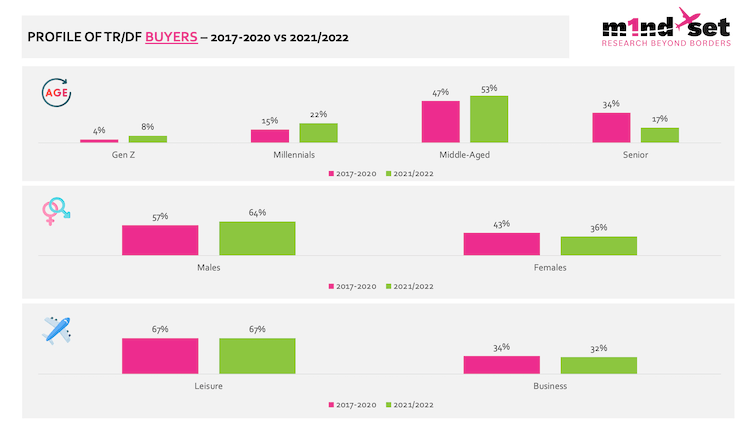
Peter Mohn, Owner & Chief Executive Officer at m1nd-set, said, "We have noticed a clear shift in trends across the various shopper segments since the pandemic and a growing interest among clients in this evolution."
According to the research Middle-aged shoppers comprise the largest age segment in terms of purchasing behaviour, but Millennials saw the highest growth from the pre-Covid period to 2021- 22. The percentage of Millennials purchasing in duty free shops increased by 7% from 15% to 22%, while Middle-aged shoppers grew by 6% from 47% to 53%. Gen Z shoppers also increased, doubling from 4% in 2017-2020 to 8% in 2021-22. In contrast, m1nd-set reports that there has been a steep decline in the percentage of Seniors purchasing in duty free shops, falling 17%, from 34% conversion in 2017-2020 to 17% in 2021-22.
Male shoppers have increased their purchasing behaviour by 7% from 57% to 64% while female shoppers saw a 7% decline, from 43% to 36%. When comparing the travel purpose segment behaviour, the research reports no movement from pre-Covid to 2021-22 among leisure travellers, with 67% purchasing in the shops still. Among business travellers however, there is a slight decline of 2% from 34% to 32% purchasing in duty free shops.
In terms of the motivating factors for visiting the duty free and travel retail shops, having time to kill at the airport and convenience are consistently among the main appeal factors across age groups, genders and travel purposes. Time to kill at the airport was the number one appeal factor for both Gen Z shoppers (27%) and Middle-aged shoppers (24%) while for Millennials the convenience factor was the most appealing factor at 27% and the second most appealing factor among Seniors, also 27%. Lower prices are another important appeal factor. This is especially true for Seniors, 46% of whom stated that lower prices are a key appeal factor, the most significant among all appeal factors across all segments.
Price and value remain the key motivators to purchasing in duty free, the research reveals. Mohn explained, "Despite all the various reasons for shopping in duty free – the convenience factor, travel retail exclusives, the guilt gift, self-indulgence or a last-minute holiday souvenir, all of which are essential aspects enticing shoppers to purchase in duty free and travel retail, at the end of the day, price competitivity and value for money are unquestionably the leading shopper drivers for all segments."
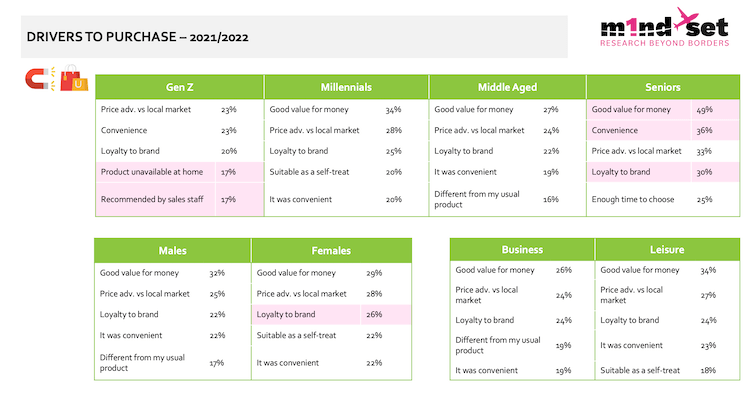
According to the research, in 2021-22 lower prices vs the domestic market and value for money are consistently quoted across all segments, whether age groups, genders or travel purposes. Good value for money is a particularly significant purchase driver for Seniors at 49% and Millennials, 34%. Convenience is also an important purchase driver for both Seniors, 36%, Gen Z shoppers and leisure travellers (both at 23%). Another common purchase driver in travel retail in 2021-22 is loyalty to the brand, especially for Seniors (30%) and Females (26%).
The research also analyses the importance of sales staff in influencing shopper behaviour. Sales associates have a significant impact on the decision to purchase and this varies considerably by customer segment as well as by region. The research reveals that the impact of the interaction has increased considerably in the wake of the pandemic as travellers set to the skies again.
Mohn said, "By understanding the behaviour among the various demographics and customer segments with regards to purchase planning, brands and retailers can adapt their pre-travel marketing and communications to the various customer segments accordingly. This is particularly the case for online marketing campaigns where the social media platforms and online advertising agencies today can provide highly targeted campaigns to very specific profiles.
The customer segmentation has proved extremely resourceful to many brand and retailer clients in preparing their consumer marketing strategies in travel retail."



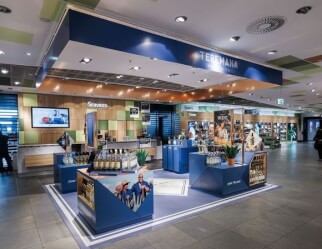

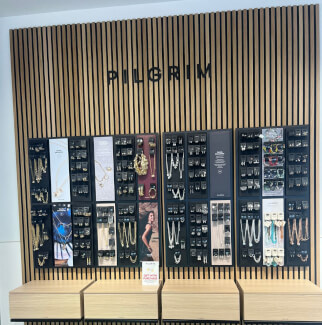
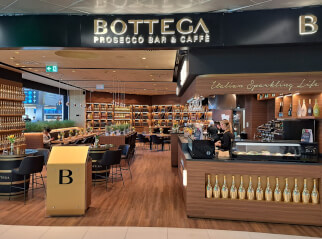
.jpg?&resize.width=322&resize.height=483)


